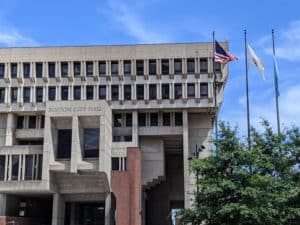Boston Mayor Michelle Wu is announcing a major overhaul of the city’s Zoning Board of Appeal, including replacing the body’s chair, with the aim of “advanc[ing] the Mayor’s goal of rebuilding trust with communities through planning-led development.”
Because Boston’s zoning code has not been updated in many years, most development projects need some form of zoning relief and must appear before the ZBA. While the Boston Planning & Development Agency board has typically been the chief hurdle most medium- and large-scale developments have needed to pass, the ZBA’s exception-granting role and the statutory requirement that projects must gain backing from a supermajority of its members has let to numerous decisions at odds with Wu’s broad development preferences and those of former mayors Marty Walsh and Kim Janey, like transit-oriented, car-light living or boosting the construction of affordable housing, with longtime ZBA Chair Christine Araujo sometimes singled out for criticism for casting votes against projects in her Roslindale neighborhood.
It also has lead to at least one bribery case, where longtime city staffer John Lynch took $50,000 from an unnamed developer to influence a ZBA vote on a South Boston condominium building. Dorchester real estate broker Craig Galvin resigned from the ZBA and City Hall staffer Buddy Christopher left his position advising Walsh after the Lynch indictment became public, but neither was never charged
“This outstanding slate of community members will play a key role in Boston’s growth as we work to build more housing and address the regional affordability crisis, support equitable and resilient neighborhoods, and shift to planning-led development,” Wu said in a statement announcing the appointments. “These appointees represent the diversity, talent, and expertise of our communities that will connect Boston’s growth to addressing our greatest challenges.”
The body has been severely understaffed for some years with numerous appointees having to continue on in their roles even after their three-year terms have expired – a situation Wu herself helped perpetuate in 2020 by convincing her colleagues to torpedo four of Walsh’s new nominees – giving the mayor an opportunity to appoint a large number of members at once. Seven members serve as primary members, with a further seven designated as alternates to fill their shoes if a primary appointee can’t make it to a meeting. The new members are:
- At-large: Giovanni Valencia, director of community organizing for Jamaica Plain Neighborhood Development Corp. (primary seat) and Alaa Mukahaal, transportation planner at Kittleson & Assoc. (alternate seat).
- Nominated by neighborhood organizations: Norm Stembridge, Roxbury Strategic Master Plan Oversight Committee co-chair (primary seat); Sherry Dong, Tufts Medicine senior director of community benefits and health equity (primary seat); Shavel’le Olivier, Mattapan Food and Fitness Coalition executive director (alternate seat); and David Aiken, The Community Builders senior project manager (alternate seat).
- Nominated by the Greater Boston Real Estate Board: Jeanne Pinado, Colliers International executive vice president (primary seat), and Katie Whewell, Newton Planning Department planning staffer (alternate seat).
- Nominated by the Boston Society for Architecture: Hansy Better Barraza, Studio Luz principal and co-founder (primary seat), and Thea Massouh, DREAM Collaborative senior project architect (alternate seat).
- Nominated by the Building Trades Employers Association: Raheem Shepard, New England Regional Council of Carpenters business representative (primary seat).
- Nominated by the Building Trades Council: Alan Langham of Dorchester (primary seat) and Dave Collins of Roslindale (alternate seat).
Pinado, Dong, and Better Barraza are being reappointed to their seats.
The slate of nominees now goes before the Boston City Council for approval.
While Wu promised a comprehensive, city-wide planning process as a candidate for mayor, the BPDA has focused its efforts so far on completing existing neighborhood-level planning processes already underway, like efforts covering Charlestown and Allston’s Western Avenue, and codifying the resulting plans into zoning. Because of this, it’s unclear on exactly what Wu expects these ZBA members to base their decisions on. Wu’s office did not immediately respond to a request for an interview with Chief of Planning Arthur Jemison, who also heads the BPDA, but the announcement of the new ZBA members said they “will work closely with [Jemison] to help advance the Mayor’s goal of rebuilding trust with communities through planning-led development while advancing equity, affordability, and resilience across all functions of the City’s development review process.”
“I want to thank the prior members for their service to the city. These ZBA appointees have a variety of experiences in development and community advocacy work in Boston’s neighborhoods, and they represent the diversity of our City,” Jemison said in a statement released along with the list of appointees. “The BPDA is focused on furthering planning and development work that addresses Boston’s greatest challenges: resiliency, affordability, and equity. I am looking forward to a collaborative working relationship with the ZBA. Together, we can aim to reduce reliance on variances as the BPDA prioritizes planning-lead development.”






